A Year of Grieving and Healing at Marjory Stoneman Douglas High School
From clear backpacks to walkouts, one 16-year-old student reflects on the past year in Parkland.
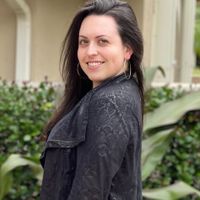
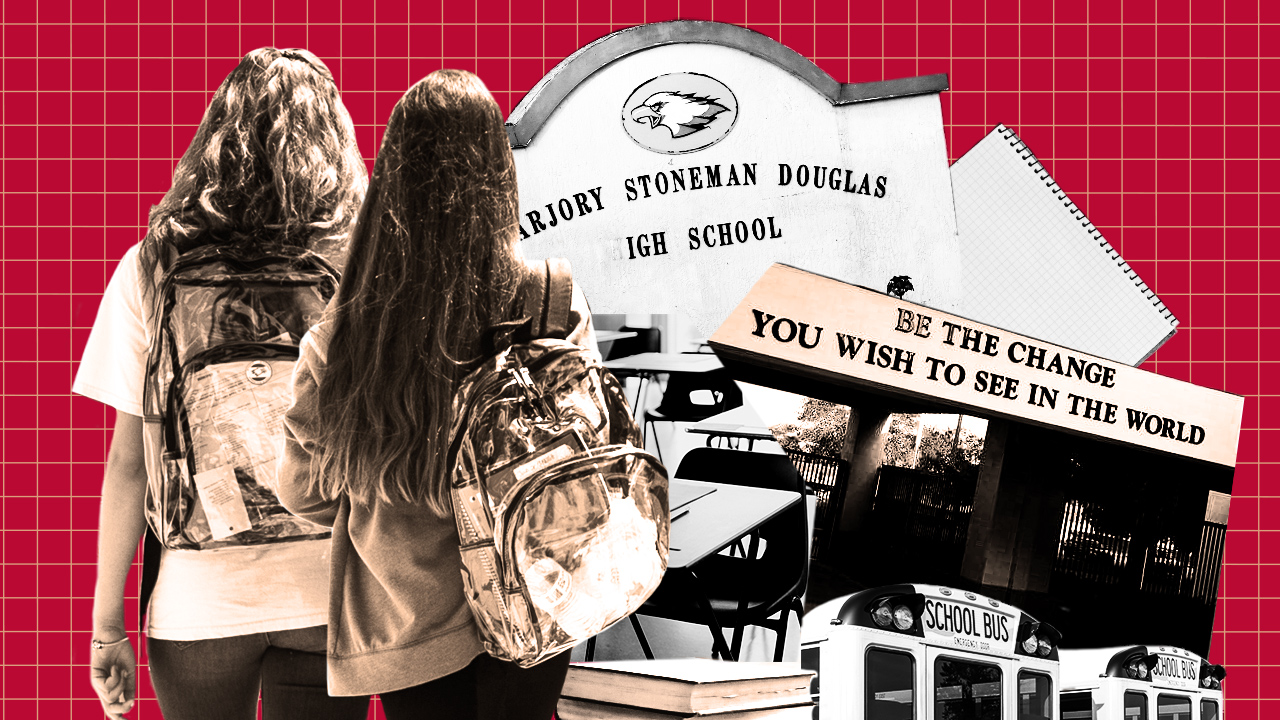
Alexandra Sullivan is a 16-year-old junior at Marjory Stoneman Douglas High School in Parkland, Florida. Here, she tells MarieClaire.com, in her own words, what the past year at MSD has been like after the tragic shooting on February 14, 2018 that left 17 dead.
It was a normal Valentine's Day. I was in my fourth period drama class rehearsing for our show, and suddenly the fire alarm went off. Nobody ever took fire drills seriously because we were so used to them. We thought, it's probably just someone in the culinary room who burned something. We left the building. I walked outside, and that's when I heard the gunshots. We all ran back inside, but we still didn't know what was happening. There was no Code Red yet. We thought it was a simulation.
When we made it back to the classroom, my drama teacher, Mrs. Herzfeld, told us our principal wasn't at the school. They wouldn't do a drill like that if he wasn't on campus. Then we found out Westglades Middle School, which is located right next door to our high school, was on lockdown. That's when we knew.
There are three different areas of the drama room: a front room, a back room, and an office. It's next to the three-story freshman building where the shooter entered with his AR-15. We all ran into the office at first, but then Mrs. Herzfeld made us go into the back closet, which is connected to the back room. I was trying to reach my parents, but the texts weren't going through because there was no service in the closet. About 70 of us piled up against each other and laid on the ground waiting. There were some people in the main room because they didn't make it to the back room, so they were hiding behind the piano. It was so hot we were fanning ourselves with monologues. Everybody jumped at the slightest sound, including my teacher's phone that kept ringing. I was shocked at how quiet we were because, well, we're a loud group of kids.
About 70 of us piled up against each other and laid on the ground waiting
I'm a very anxious person, and I was surprisingly calm. I remember not being worried about myself at all, but more worried about every single person around me. I was holding my friend's hand the whole time making sure she was okay, which helped me because I wasn't focusing on myself. One kid was trying to show us funny pictures on Twitter to get our minds off of it. There was another boy who fell on the ground and started to have a panic attack, but we needed him to get up because there wasn't enough room for all of us to stand around him. Now, whenever I see someone fall on the ground it triggers me. It brings everything back.
Two hours later, we were dismissed by the police. It felt like we were in a movie. Until this very day, it's still really hard to process, and it doesn't feel real. I had all of my classes in the freshman building that day except for this one.
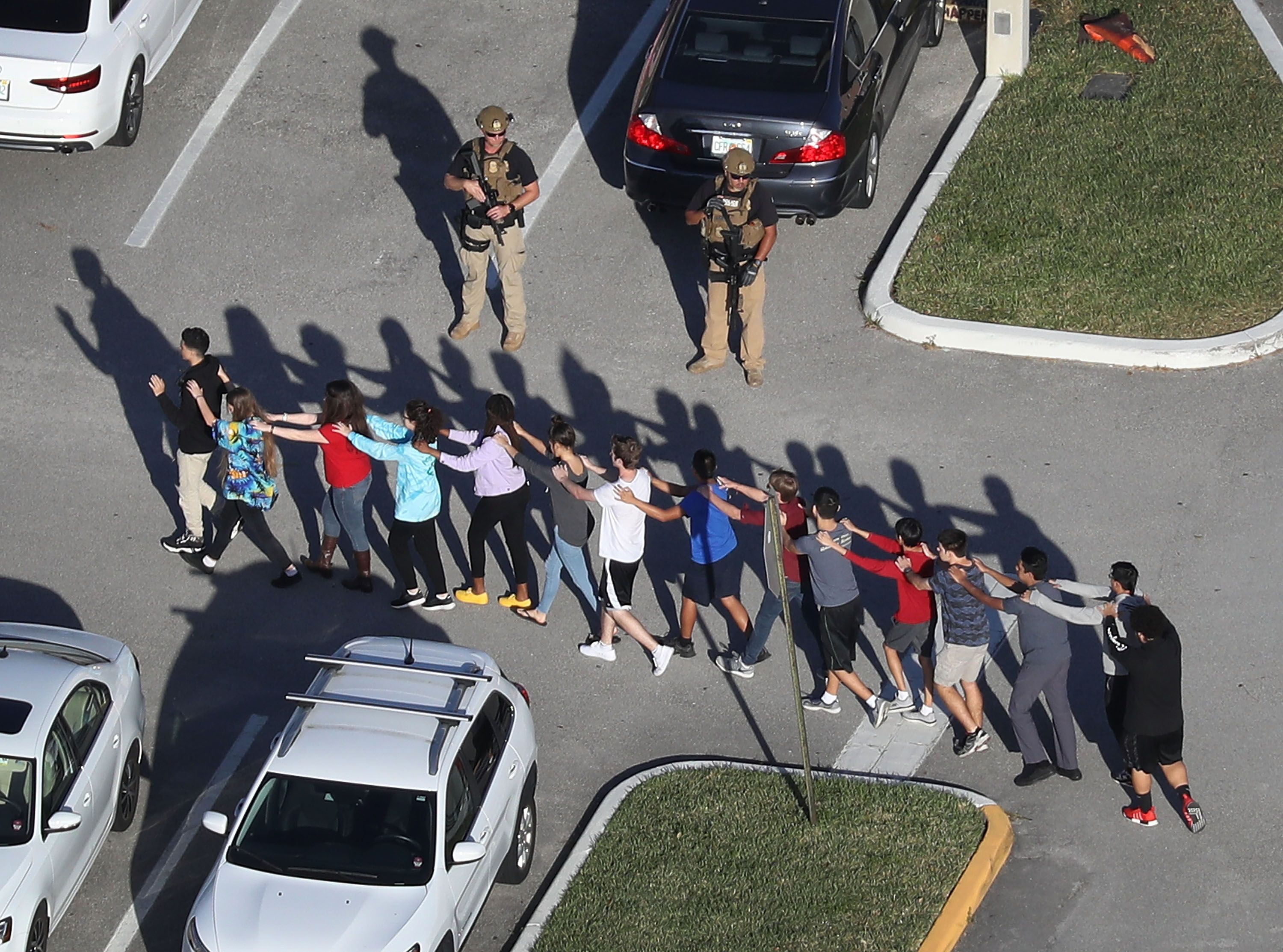
Students are guided by the police to exit the Marjory Stoneman Douglas High School campus on February 14, 2018.
Two weeks later, on February 28, we went back to school. I was scared—mainly because I didn't know what to expect or how I would react—but I wanted to go. I missed everyone. I wanted to see my teachers. Plus, all of my stuff was still there—my laptop, my backpack, everything. They had us go to the school the weekend before to get our new room assignments because we had a lot of classes in the building so everyone had to be relocated.
Get exclusive access to fashion and beauty trends, hot-off-the-press celebrity news, and more.
Aside from the day of the shooting, that first day back was probably the craziest day of my life. There were so many people there—the police, the service animals, the media. They were just lined up across the streets and in front of the gates trying to get in and asking us questions. It was really overwhelming. Every single one of my teachers cried that day. All we did in class was talk about what happened. We really didn't do anything for the rest of the year, if I'm being honest.
My favorite English teacher ended up telling us her story later that week. She was shot in the arm. She didn't even realize it happened in the moment because she was so worried about her students. They had to tell her what had happened to her. My biology teacher had three students who were killed. Two of them were in my class: Alyssa Alhadeff, 14, and Cara Loughran, 14. We walked in and she had already put roses on their desks. I broke down in tears. I wasn't even close with them, but I wish I had gotten to know them better.
We could have never predicted something like this.
About a week after we came back to school, we got an email saying everyone needed to pick up their clear backpack. They were trying to make us feel safer. One person put a fish in it. (No joke, they filled the backpack up with water.) Guys put tampons in them. Clear backpacks were a good idea in their heads, but it just didn't work out how they wanted it to. The backpacks were falling apart, and I remember they even ran out of them at some point so people started to use Publix bags instead. The administration didn't enforce it this year—probably because they realized it was pretty stupid.
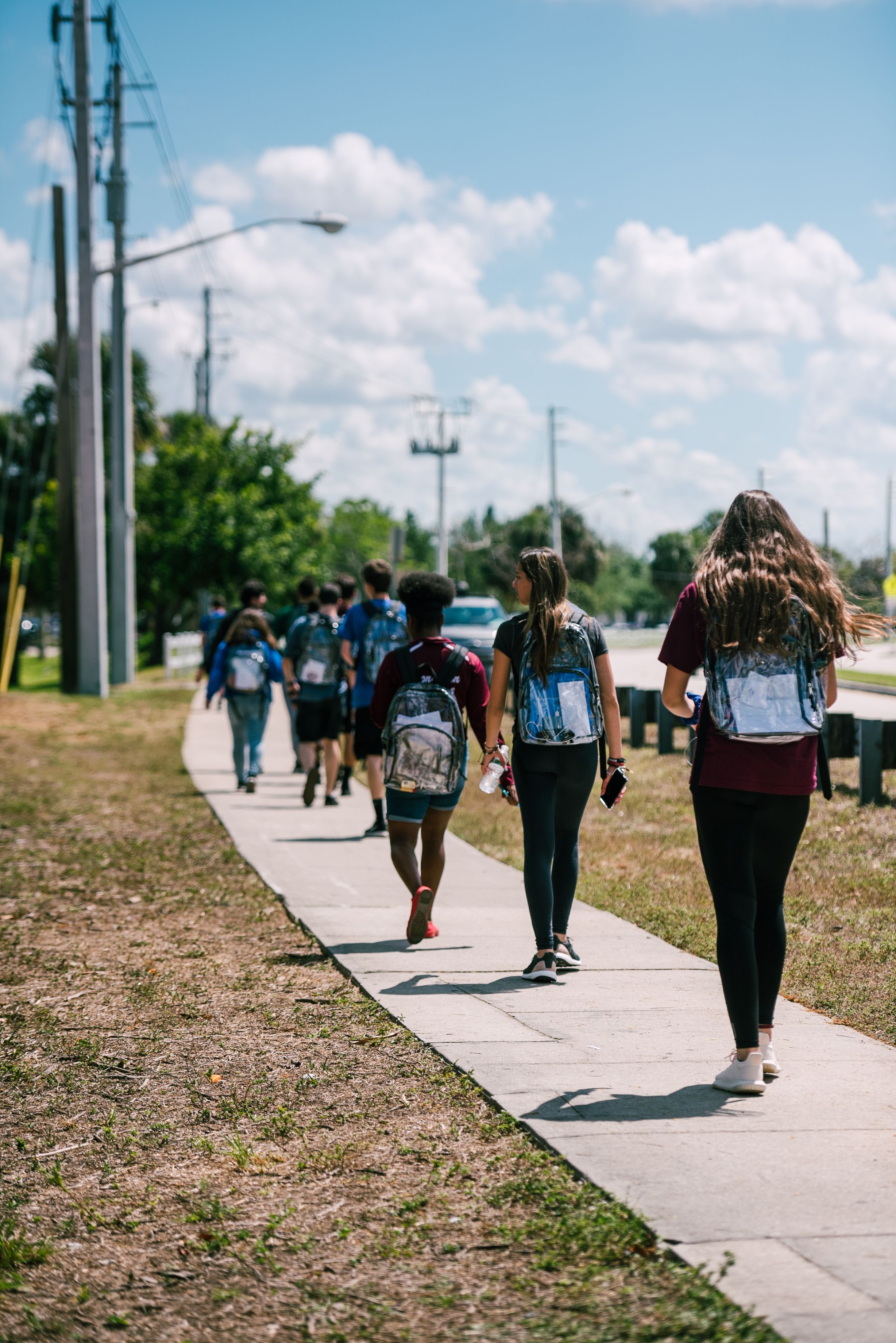
Students walk home from school with their clear backpacks April 2018.
Before we officially went back, the MSD Yearbook staff, which I'm on, met with our adviser Mrs. Lerner at Pine Trails Park. As a team, we needed to decide the direction of the yearbook and what we were going to do to honor the 17 victims. Mrs. Lerner asked us if we wanted to finish the yearbook, and we all said yes. That was a really emotional moment. We were the first yearbook to cover a mass shooting like this.
The theme of our book was already "As One." Mrs. Lerner asked us if we wanted to change the theme or keep it, but everyone agreed it was perfect. We wanted to memorialize the 17, so we had to contact the publisher and ask them to add pages and give us more time. We basically had to start the book over from scratch. It was originally due in March, so we were wrapping it up right before the shooting happened.
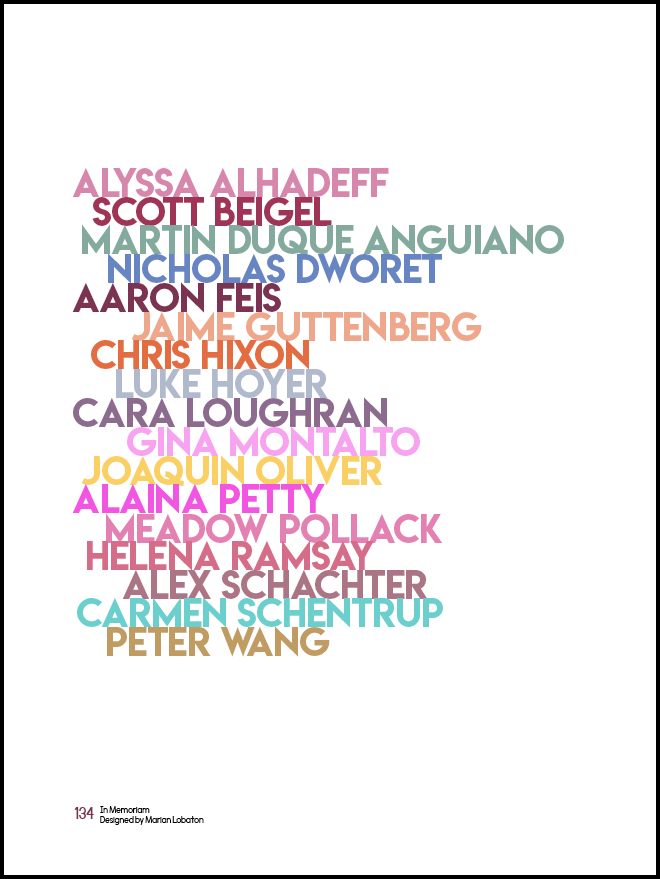
One of the memorial pages in the 2018 Marjory Stoneman Douglas High School yearbook.
We ended up having a spread for every person who was killed. We reached out to their friends, family, and anybody else who wanted to talk about them to get the most accurate stories we could. But we didn't want the whole book to focus on what happened. We wanted to keep our school spirit and include all of the events that occurred earlier in the school year.
It's surreal to look at how everything was before that day. We had a profile on Emma González before she became an activist. There's a picture of Joaquin Oliver's girlfriend, Victoria, with the flower he gave her that day before he was killed. I ended up writing a couple of the victim profiles, but we all worked together on them. It was a lot of pressure and it was hard to talk to the people who knew them well—especially when it was so new and so real. But we got the messages across, and I'm really proud of it.
When we went back to school this year, there were four to six fire drills in the first month. It was really bad—kids were pulling it, stuff was burning in the microwave. The school tried to turn them off as quickly as possible, but that's enough for somebody to freak out and get really triggered. People around me were crying and having panic attacks.
Teachers told us they understand what we're going through and to not be afraid to talk to them. On the other hand, there are teachers who got even stricter about assignments. There are some who weren't there last year who are still trying to figure out how to handle all of this.
I don't think I'm ever going to feel safe in a classroom again.
We have people from the non-profit Guardian Angels who come to our school. They're these men in red berets who volunteer their time every day to be a friendly face to the students. One, named Cobra, has been here with us since the day of the shooting. He came back this year and helps direct traffic. There are also service dogs on campus. People come up and pet them in-between classes. I love this one golden retriever named Cole. He's the cutest.
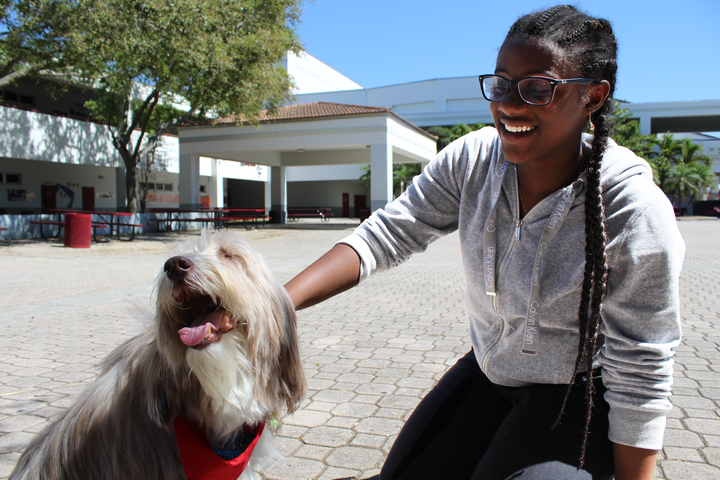
An MSD student plays with one of the therapy dogs on campus following the shooting last year.
I don't think I'm ever going to feel safe in a classroom again. It's all the random little noises—textbooks dropping, people on campus fixing doors with hammers—that make you think the worst. You have to fight it. You have to tell yourself it's okay. They keep giving us Code Red drills, but telling us the day before it happens. Recently, I was taking a test when we had one. I couldn't focus afterwards so I got a 20 percent. Your mind kind of just wanders.
Then there's the talk about teachers having guns in classrooms. I don't think guns belong in schools at all. You never know how people are going to react in a situation. You can do Code Red drills and say this is going to happen, but it's not going to work out that way. There are also people who want to do active shooter drills in addition to the Code Red drills where they actually put you through the simulation with a fake gun and sound effects. I think that's a horrible idea. Nobody should have to go through that trauma again.
In November, the school reassigned some administrators and that caused a really big deal. Teachers and students held protests and walkouts. I remember being anxious that something was going to happen because everyone was so on edge. It just feels like some days something bad is going to happen, and it's scary to have that mindset.
As the one-year anniversary approaches, all of the eyes on us have been really hard. Initially, everyone split up and was like, how am I going to deal with this? People turned to activism, to art, to music. They did what they knew how to do best.
A lot of people were focusing on healing before they went on to activism. I isolated myself a little bit in the beginning because I didn't know what I wanted to do, but then I ended up being best friends with Sawyer Garrity and Andrea Peña who created the song "SHINE." Music is the most healing thing in the whole entire world, and I definitely learned that this year.
People wanted to have their own way to tell their stories, like Mrs. Lerner who published Parkland Speaks, and people who were involved with the movie Inside Building 12 (2019). Some people found their platforms quicker than others, and some people are still trying to find theirs. Nobody was trying to gain fame from it. They were all just trying to heal and do what they felt was important. It did end up causing some division in the beginning, but at the end of the day we're all one big community. We're all from the same school. Victoria, Joaquin's girlfriend, and Mrs. Reoven, an AP Psychology teacher, recently created #ProjectGrowLove—a memorial garden in front of the school—and it's beautiful.
Hey guys! My friend @17roseV began project grow love to remember our 17 friends that we lost that day (because all the memorials were taken down) so if you’re in the area bring some flowers and feel free to plant. #ProjectGrowLove pic.twitter.com/uoEy5s8MuiJanuary 13, 2019
From day one, I noticed a shift in my school and my community. People are being a lot kinder to each other. They're realizing that anything can happen. There's just a lot more love going around as we still try to heal.
There isn't a day I haven't thought about February 14th. Every single time I walk past that building I think about what happened—there's no way you can't. The lights occasionally still turn on and it's so scary. Now there's a fence around the building. It's just a lot to think about. Everyone wants it torn down, but they can't tear it down until after the investigation.
Although there's still a lot of pain and heartache we're dealing with a year later, there's always a reason to smile. I think everyone needs to keep holding on to that. Some days are better than others. Everything will be okay even though it doesn't feel like it right now.
If you'd like to contribute to SHINE MSD, the arts therapy program that Alexandra is a part of, you can do so here.
RELATED STORIES


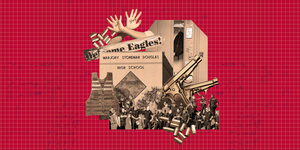
Rachel Epstein is a writer, editor, and content strategist based in New York City. Most recently, she was the Managing Editor at Coveteur, where she oversaw the site’s day-to-day editorial operations. Previously, she was an editor at Marie Claire, where she wrote and edited culture, politics, and lifestyle stories ranging from op-eds to profiles to ambitious packages. She also launched and managed the site’s virtual book club, #ReadWithMC. Offline, she’s likely watching a Heat game or finding a new coffee shop.
